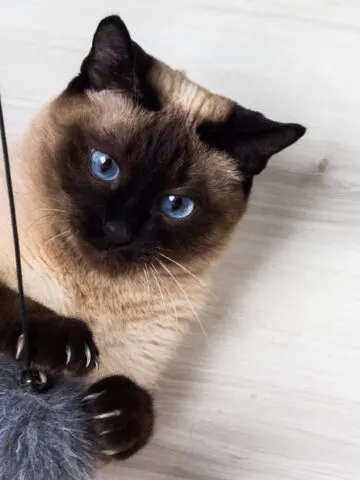Cats are strange little creatures. If you consider yourself more of a dog person, you may find certain cat behaviors rather unusual and inexplicable.
Actions like pawing things off a table, walking sideways, and even playing with rubber bands for hours on end.
Cats are born hunters, even domesticated ones, and chasing a rubber band seems to be one of their favorite pursuits.
Cats also chew rubber bands because of the texture, and a bouncy rubber band is too much to resist.
When cats play, they engage in predatory behavior, and a rubber band that bounces away from them feels like prey. Playing with a few certain items around the house is pretty common cat behavior.
While there may not be a satisfactory explanation why cats favor one thing over another, they are still fascinating creatures. Read on to find out why cats love rubber bands as much as they do.
6 Reasons Why Cats Like Rubber Bands
Cats Like Rubber Bands Because Of Their Texture
Cats will play with a rubber band for what may seem like a long period of time. To a cat, rubber bands may feel like pulling tendons off of live prey.
The chewiness and rubbery texture may excite them and they tend to get rather aggressive when “hunting.”
Try not to pull a rubber band away from a cat’s mouth. Rather, observe your cat closely and wait patiently until they briefly let go of the rubber band.
Shoo your cat away without scaring it, and scoop up the rubber band before they actually swallow it.
Cats Like Rubber Bands Because Of Their Smell
Cats have an incredible sense of smell and can detect scents 10-20 times better than the average human nose.
The smell of a rubber band may also be one reason why cats prefer playing with this ordinary household item. Chemicals in the rubber sometimes mimic the smell of pheromones and can excite a cat to no end.
Pheromones play an important role in deciphering cat behavior and cats release pheromones at different times for entirely different reasons.
These can be anything from marking territory to warning other cats about the need to procreate.
When cats smell chemicals coming from a rubber band, they will react by pouncing, chewing, or running away with it.
Your Cat May Be Hoarding Rubber Bands
Cats are notorious hoarders and will stash things like socks, bottle caps, pens and pencils, and, yes, rubber bands.
Even when not hungry, cats are opportunistic creatures and will hunt prey if and when one presents itself.
This hoarding sense may stem from bringing prey back to a den or gathering useful materials for a nest.
Often you will find secret stashes behind a couch or under a rug or bed. So if you have a cat and are missing rubber bands, hair ties, or even socks, check these hiding places.
You may be residing with an adorable cat burglar without your knowledge.
Your Cat May Chew On Rubber Bands Because They’re Stressed
Cats get stressed too, and their anxiety may result in attacking rubber bands and chewing on them nonstop.
Cat anxiety can stem from a stressful household, unruly small children, illness, or even other cats. If you notice your cat incessantly chewing on a rubber band or other items, it may be trying to self-soothe.
Observe your cat and its environment carefully to recognize any sources of anxiety or conflict. Once identified, try to remove the offending element or steer your cat away from it.
If the constant chewing stops, you may have solved the problem.
Your Cat May Have a Nutritional Deficiency
If your cat is intent on tearing apart a rubber band and swallowing it, this is not a good problem to have.
One possible reason is the cat may be seeking out a particular nutrient they’re not getting in their diet. Fortunately, diet deficiencies are an easy fix when treated by a knowledgeable vet.
Your Cat May Have Pica
If a nutritional deficiency is not the culprit, your cat may have a form of Pica. Pica is the uncontrollable urge to eat inedible items such as plastic, fabric, rubber, or paper.
The cause of Pica remains unknown and may result from being weaned too early, genetics, or compulsive disorders.
Some cat breeds may also be more prone to Pica than others. Additionally, underlying medical issues may also cause the condition.
These issues include feline immunodeficiency virus or FIP, hyperthyroidism, parasites, brain tumors, or diabetes.
What To Do If A Cat Swallows A Rubber Band
Do Not Panic
If you see your cat swallow a rubber band, the most important thing to do is to stay calm. Do not rush to your cat and forcibly open their mouth and stick your finger down their throat.
Approach your cat slowly, pet them, and see if you can open their mouth gently.
If you see the rubber band, slowly try to retrieve it. If it is too deep or you feel any resistance, stop and immediately take your cat to the vet.
Observe Litter Box Activity
If the rubber band is small and your cat continues acting normally, start monitoring their litter box activities.
Often, the cat will pass the rubber band in their stool and carry on as if nothing strange has happened. However, it may take several hours before a cat poops out the offending item.
If you see your cat passing the rubber band and it gets stuck in their bottom, try very gently to ease it out.
If gentle pulling does not work, do not forcibly tug as this will cause damage to the cat’s internal organs. Immediately stop what you are doing and take your cat to the vet.
A big problem when cats swallow rubber bands is it will interfere with a cat’s gastrointestinal tract. This interference may result in immediate blockage or tangling of the intestines.
Instead of playing the waiting game, early vet intervention is best and may save your cat’s life.
Be Alert For Signs Of Distress In Your Cat
Foreign objects in the stomach is not an ideal situation for anyone, including cats. Despite a cat’s powerful acidic gastric juices, a rubber band is no match for their digestive system.
Check to see if your cat exhibits these signs of distress.
- No appetite
- Vomiting
- Not pooping or has constant diarrhea
- Listless and has no energy
- Not wanting to be picked up if your hand is on their belly
- Changes to drinking habits–not drinking at all or throwing up right after
If you note any one of these sudden behavior changes, seek veterinary attention immediately.
Related Questions
Why does my cat sleep all the time?
Cats are predatory creatures and sleep as much as they can in order to have the energy to hunt.
Your house cat may not need to hunt, as you provide them with food on a regular basis. But, to this day, the instinct to hunt is hardwired even in domesticated cats.
Since your cat cannot fulfill their hunting instinct, give them toys and activities to expend all that pent-up energy. A bored cat is not a happy cat.
If your cat has nothing better to do, they may start engaging in destructive behavior like chewing on rubber bands.
How do I stop my cat from clawing on the furniture?
To curtail this unwanted behavior, do not declaw your cat. Declawing is equivalent to cutting off their fingers and is a painful and debilitating process no cat should experience.
Instead, ensure your cat has their own beds and scratching posts they can sink their claws into. Clawing, or scratching, is yet another instinctive cat activity that is simply part of their DNA.
You cannot stop a cat from clawing, so give them something of their own to happily scratch away.
Why does my cat walk sideways?
You may suddenly see your cat walking sideways with their back hunched up as high as it can go.
It looks funny but also freakish when they do this in the dark in the middle of the night. Worry not it is not time to call neither veterinarian nor exorcist.
When a cat starts walking sideways, they may be sensing a threat, trying to intimidate, or are being playful. This sideways stance is a way for them to look bigger to their enemies, imagined or not.
However, when you see kittens attempting this intimidation tactic, they simply want to play with you or another cat.
Summing It Up
Despite the many eccentric traits your cat presents every now and then, they are wonderful companions to have.
As with any other being, it may take many years for you to completely understand your furry friend. It may also take them a while to know you, interpret your body language, and read your intentions.
Take time to understand your feline family member and accept their unique quirks. And be prepared to have one of the most fulfilling and loving relationships you will enjoy in your life.
Stacy is a lifelong animal lover who truly believes life just isn’t complete without pets. She’s had pets her whole life (including three dogs and a cat living under the same roof, somewhat harmoniously). She currently resides in NOLA with her husband, son, and two pups, Scooby “Dooby” Doo and Zoey. Stacy always makes a point to learn everything she can about her fur babies, and she has been writing about the pet-parent life for over two years.



Leave a comment
You must be logged in to post a comment.